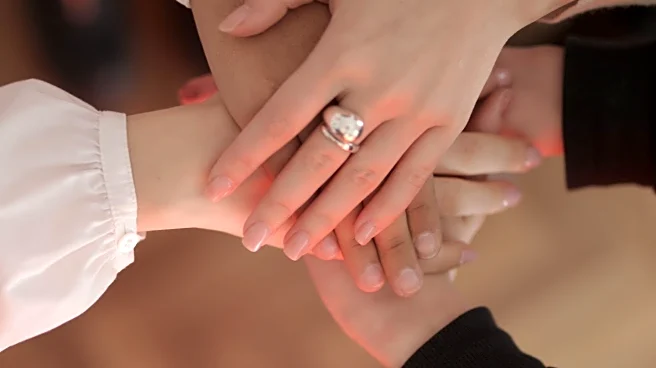What is the story about?
What's Happening?
Jennifer Hoffman, a Connecticut-based therapist and founder of Instar Healing, emphasizes the benefits of age-gap friendships, suggesting they can enrich lives in ways that same-age connections cannot. Hoffman argues that these friendships reduce the pressure to compete or compare, as individuals in different life stages are less likely to feel competitive or envious. This dynamic allows for a more genuine enjoyment of each other's company and the celebration of each other's successes without anxiety about personal achievements. Additionally, age-gap friendships offer unique perspectives through the wisdom and experience of older friends, providing built-in mentoring opportunities. This concept is gaining cultural acceptance, similar to the normalization of age gaps in romantic relationships, as seen in recent films.
Why It's Important?
Age-gap friendships can play a significant role in personal development by offering diverse perspectives and reducing competitive pressures. These relationships can foster empathy and understanding across generations, contributing to personal growth and emotional resilience. For younger individuals, the mentorship from older friends can provide valuable insights into career decisions and life challenges, potentially leading to more informed choices. Conversely, older individuals can benefit from the fresh perspectives and energy of younger friends, enhancing their social engagement and adaptability. This dynamic can strengthen social bonds and improve mental health, making age-gap friendships a valuable component of a well-rounded social network.
What's Next?
As society continues to embrace diverse relationship dynamics, age-gap friendships may become more prevalent and socially accepted. This shift could lead to increased opportunities for intergenerational collaboration in various sectors, including business, education, and community development. Organizations might begin to recognize the value of diverse age groups working together, potentially leading to initiatives that encourage mentorship and collaboration across generations. Additionally, public discourse around the benefits of age-gap friendships could inspire individuals to seek out these relationships, further integrating them into the social fabric.
Beyond the Headlines
The growing acceptance of age-gap friendships may challenge traditional notions of friendship and social interaction, prompting a reevaluation of how relationships are formed and maintained. This could lead to broader societal changes, such as increased inclusivity and diversity in social settings. Furthermore, the emphasis on mentorship and shared experiences across generations could influence cultural narratives around aging, potentially reducing age-related stereotypes and biases. As these friendships become more common, they may also contribute to a more cohesive and understanding society, bridging generational divides.















